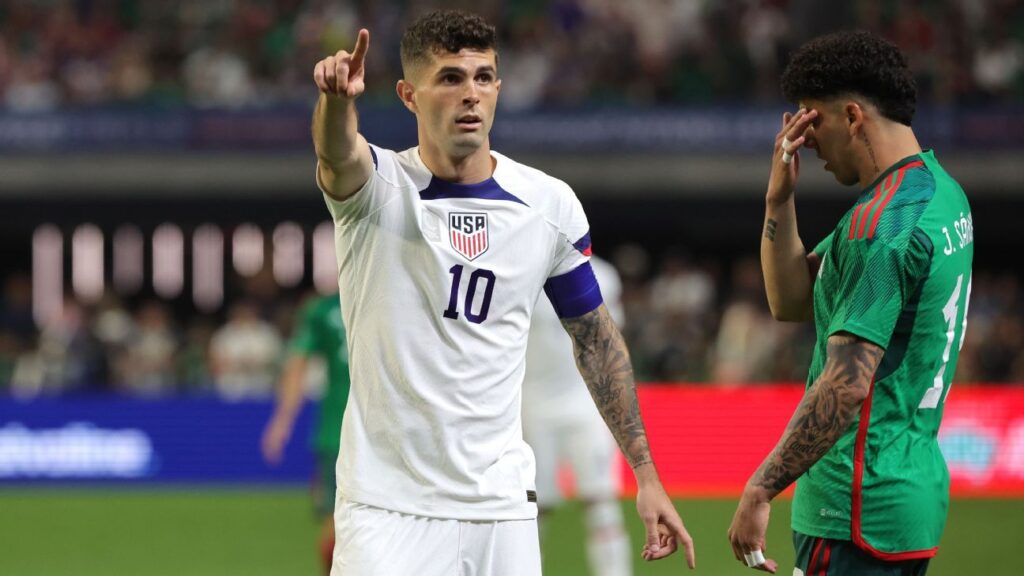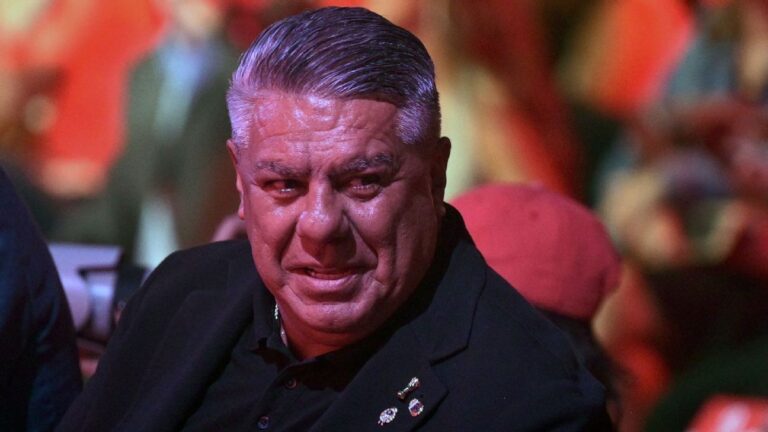LAS VEGAS — Thursday’s Concacaf Nations League (CNL) semifinal against Mexico was the U.S. men’s national team’s version of “Everything Everywhere All at Once,” in that there were enough deviations from perceived reality to fill a feature-length movie.
There was the news that emerged just before kickoff that Gregg Berhalter will be making an unexpected return as U.S. manager. This after the U.S. Soccer Federation let his contract expire last December, investigated him for a domestic violence incident that was made public by the family of midfielder Gio Reyna, and then concluded it was satisfied with his explanation and maintained he was still eligible to return. In the meantime, the USSF employed not one but two interim coaches: Anthony Hudson and B.J. Callaghan. It then used a search firm to hire a sporting director, Matt Crocker, who simply led the USSF back to where it was in December — handing Berhalter what is technically his second stint as U.S. manager.
Time is indeed a flat circle.
– Stream on ESPN+: LaLiga, Bundesliga, more (U.S.)
The game against Mexico was chaos, and not just because the U.S. prevailed 3-0 instead of its usual 2-0 scoreline. There were two goals from Christian Pulisic, a third from substitute Ricardo Pepi and four red cards — two for each side.
The lopsided scoreline brought out the usual anti-gay chant from El Tri fans, and with Step 1 of Concacaf’s anti-discrimination protocol already enacted, referee Iván Barton blew his whistle with only seven of the 12 minutes of second-half stoppage time played. Concacaf insisted that the game was not abandoned and that it was stopped at Barton’s discretion. It later issued a statement that it “strongly condemns the discriminatory chanting” and that “the Confederation is in the process of urgently establishing further details and reports from security and match officials and will make a further statement in short order.”
That didn’t change the U.S. team’s thoughts on the crowd’s behavior.
“[The chant] goes against everything that we stand for on our side,” said U.S. keeper Matt Turner. “We’ve been very open and vocal about the strength of our team being our diversity, the strength of our nation being its diversity. So to use something so divisive during a spirited game … it has no place in the game.”
Oh, and the U.S. was led on the sideline by Callaghan, who was serving as a head coach for the first time at the professional level. No problem. While Callaghan led his side to its most lopsided scoreline against Mexico in official competition, he will probably be in charge for only one more game: Sunday’s final against Canada. That said, his postmatch comments had him sounding as if he’d been in the role for ages.
“We were confident in the game plan that we were able to put together, and I think the performance from our side speaks for itself,” he said. “We couldn’t be more happy with the performance, but at the same time we also understand that we need to turn the page and already start the recovery and preparation process to play versus Canada.”
Everything that transpired served to overshadow the biggest pregame talking point: the debut of Arsenal forward (and designated savior) Folarin Balogun. The U.S. has been looking for a dependable No. 9 for years, though historically there have been some good ones. Eric Wynalda was at one time the leading U.S. scorer with 34 career goals, and Brian McBride spearheaded the U.S. attack for a considerable period as well. (Landon Donovan and Clint Dempsey spent much of their international careers as midfielders.)
But recent years have seen the U.S. struggle to get much, if any, production out of the spot. So when Balogun scored 22 times in 39 league and cup appearances on loan at French side Stade de Reims this season, and then declared for the U.S. at the expense of England and Nigeria, U.S. fans began to dream big.
Fulfilling such sky-high expectations will have to wait a bit. Balogun had some bright moments, including a layoff to Pulisic that sparked an attack that ended with the U.S. captain shooting over the bar from just 10 yards. But overall he was somewhat subdued. He had the fewest touches of any U.S. starter and rarely threatened in the attacking half. Some of that was down to his lack of familiarity with teammates, who rarely gave Balogun the kind of passes into the channels that allowed him to use his speed.
“I’m not going to lie, it wasn’t my best game,” Balogun said. “I think it’s important; at the same time I have to be realistic coming into a new environment with new teammates. And of course I’m playing in a semifinal, so it’s never going to be an easy game of football, but at the end of the day, I’m just happy we got a result.”
Yet Balogun still managed to endear himself to teammates and fans when, in the 69th minute, he chased down Mexico defender César Montes, dispossessed him and drew a foul that resulted in a red card to Montes. It also sparked a melee that saw U.S. midfielder Weston McKennie get ejected as well.
The chippiness didn’t end there, as U.S. defender Sergiño Dest was sent off after a scrap with Mexico substitute Gerardo Arteaga, leaving both teams to finish the game with nine players each. As much as Callaghan tried to back his men publicly, it did take some luster off the win. McKennie and Dest will be suspended for Sunday’s win, a reality that wasn’t lost on Pulisic.
“It’s crazy. All year round, I’m never a part of games like this. And then I come here and it’s like, suddenly, everyone is just … it was a mess,” he said. “But I was disappointed in the end. I really wish some of our guys kept their heads a little bit better. It just turned into something that wasn’t this beautiful game. We did enough to show off on the field with our play that we deserve to be winning that game and a dominant performance, and now that all this, this stuff happened, it just takes away from the way we played.”
Pulisic was at the heart of that dominant performance, putting the U.S. ahead in the 37th minute by pounding on a Mexico turnover and finishing past Memo Ochoa. Then he doubled the advantage just seconds into the second half by redirecting Tim Weah’s pinpoint cross after he was played into space by McKennie.
It was as complete a team performance as the U.S. has had against Mexico since the turn of the century. The defense was barely noticed, in a good way. The U.S. was superior in its chance creation and its finishing. And Pulisic’s performance drove home an undeniable fact: Balogun might be the shiny new toy, but this is still Pulisic’s team, as evidenced by his goals and leadership.
It’s Berhalter’s team again too. There were several reasons for Berhalter not to return. The domestic violence incident remains tough to get past. So does his handling of Gio Reyna after the World Cup when he all but outed the midfielder for having a bad attitude and nearly sent him home. A second cycle, when messages can get stale, was yet another reason to move on to a different manager.
The reasons the USSF’s leadership brought back Berhalter will be revealed in the coming days. But the vast majority of players, at least those who spoke publicly, backed him in recent weeks. Pulisic was among those who gave Berhalter strong support, and he reiterated that after the match.
“You can see, today is a testament of the work that [Berhalter] put into this team,” he said. “B.J. picked up right where he left off, and it’s a testament to him, a testament to this team, the way that we just continued and just put on performances like that. So if that’s not enough evidence [to support Berhalter], that’s all right. People are going to hate.”
As satisfying as the victory was, the U.S. still has one more game to win to repeat as CNL champion. Canada’s skill and speed on the wings will be tough to get past, especially without McKennie and Dest. But the U.S. is determined to do whatever it takes to prevail, no matter how much chaos it might encounter.




